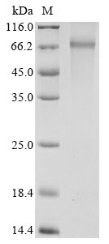CUSABIO inserts the human Pyruvate dehydrogenase E1 component subunit alpha, somatic form, mitochondrial (PDHA1) (31-390aa) encoding gene fused with the N-terminal 6xHis-GST-tag gene into a plasmid vector to form recombinant plasmid, which is then introduced into E.coli cells. E.coli cells demonstrating successful uptake of the recombinant plasmid are selected based on their ability to survive in the presence of a specific antibiotic. The positive E.coli cells are cultured under conditions that promote the expression of the gene of interest. Following expression, affinity purification is used to isolate and purify the recombinant human PDHA1 protein from the cell lysate. Denaturing SDS-PAGE is then applied to resolve the resulting recombinant human PDHA1 protein, demonstrating a purity greater than 85%.
The PDHA1 gene is responsible for making a key part of an enzyme called pyruvate dehydrogenase complex (PDHα), which helps turn pyruvate into acetyl-CoA, an important step in how our bodies use glucose [1] [2] [3]. Problems with this gene can lead to diseases like Alzheimer's, epilepsy, Leigh's syndrome, and problems with memory in diabetes [2]. PDHA1 also plays a role in how cells use oxygen and seems to affect how aggressive prostate cancer cells are [4]. Some new research suggests that PDHA1 is important for how cancer cells change their metabolism to grow [5]. It's also involved in how our cells use pyruvate in the energy-making parts of cells, and changing how it's activated can affect its job [6]. When PDHA1 isn't working right, it can change how our cells respond to certain stresses, like when they need to clean up or when they're damaged [7]. Plus, PDHA1 seems to be involved in how cells respond to signals from insulin, which might be related to how cancer starts [8]. Overall, PDHA1 is a key player in many important processes in the body, and understanding it better could lead to new treatments for diseases.
References:
[1] G. Nunes, L. Mueller, N. Silvestri, M. Patel, L. Wrabetz, M. Feltriet al., Acetyl‐coa production from pyruvate is not necessary for preservation of myelin, Glia, vol. 65, no. 10, p. 1626-1639, 2017. https://doi.org/10.1002/glia.23184
[2] W. Chen, X. Sun, L. Zhan, W. Zhou, & T. Bi, Conditional knockout of pdha1 in mouse hippocampus impairs cognitive function: the possible involvement of lactate, Frontiers in Neuroscience, vol. 15, 2021. https://doi.org/10.3389/fnins.2021.767560
[3] Ö. Özden, S. Park, B. Wagner, H. Song, Y. Zhu, A. Vassilopouloset al., Sirt3 deacetylates and increases pyruvate dehydrogenase activity in cancer cells, Free Radical Biology and Medicine, vol. 76, p. 163-172, 2014. https://doi.org/10.1016/j.freeradbiomed.2014.08.001
[4] Z. Ye, X. Li, Y. Ji, X. Li, Y. Li, D. Yuet al., Pyruvate dehydrogenase expression is negatively associated with cell stemness and worse clinical outcome in prostate cancers, Oncotarget, vol. 8, no. 8, p. 13344-13356, 2017. https://doi.org/10.18632/oncotarget.14527
[5] L. Deng, A. Jiang, H. Zeng, X. Peng, & L. Song, Comprehensive analyses of pdha1 that serves as a predictive biomarker for immunotherapy response in cancer, Frontiers in Pharmacology, vol. 13, 2022. https://doi.org/10.3389/fphar.2022.947372
[6] N. Ruiz, V. Mohan, J. Wu, S. Scott, M. Kreamer, M. Benejet al., Dynamic regulation of mitochondrial pyruvate metabolism is necessary for orthotopic pancreatic tumor growth, Cancer & Metabolism, vol. 9, no. 1, 2021. https://doi.org/10.1186/s40170-021-00275-4
[7] Z. Geng, Y. Yuan, D. He, H. Lee, H. Wang, N. Niuet al., Rna-seq analysis of obese <i>pdha1<sup>fl/fl</sup></i>lyz2-cre mice induced by a high-fat diet, Experimental Animals, vol. 72, no. 1, p. 112-122, 2023. https://doi.org/10.1538/expanim.22-0054
[8] A. Hossain, R. Islam, J. Kim, O. Dogsom, K. Cuong, & J. Park, Pyruvate dehydrogenase a1 phosphorylated by insulin associates with pyruvate kinase m2 and induces linc00273 through histone acetylation, Biomedicines, vol. 10, no. 6, p. 1256, 2022. https://doi.org/10.3390/biomedicines10061256"




